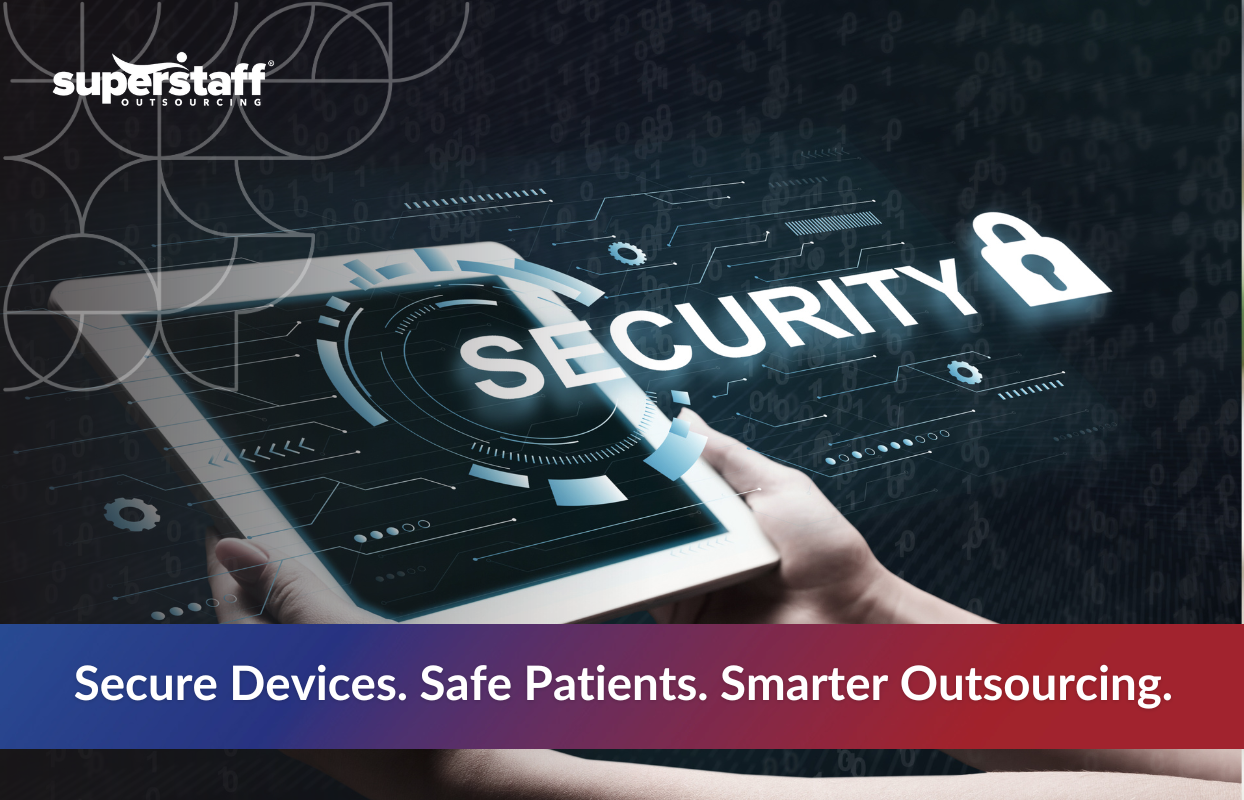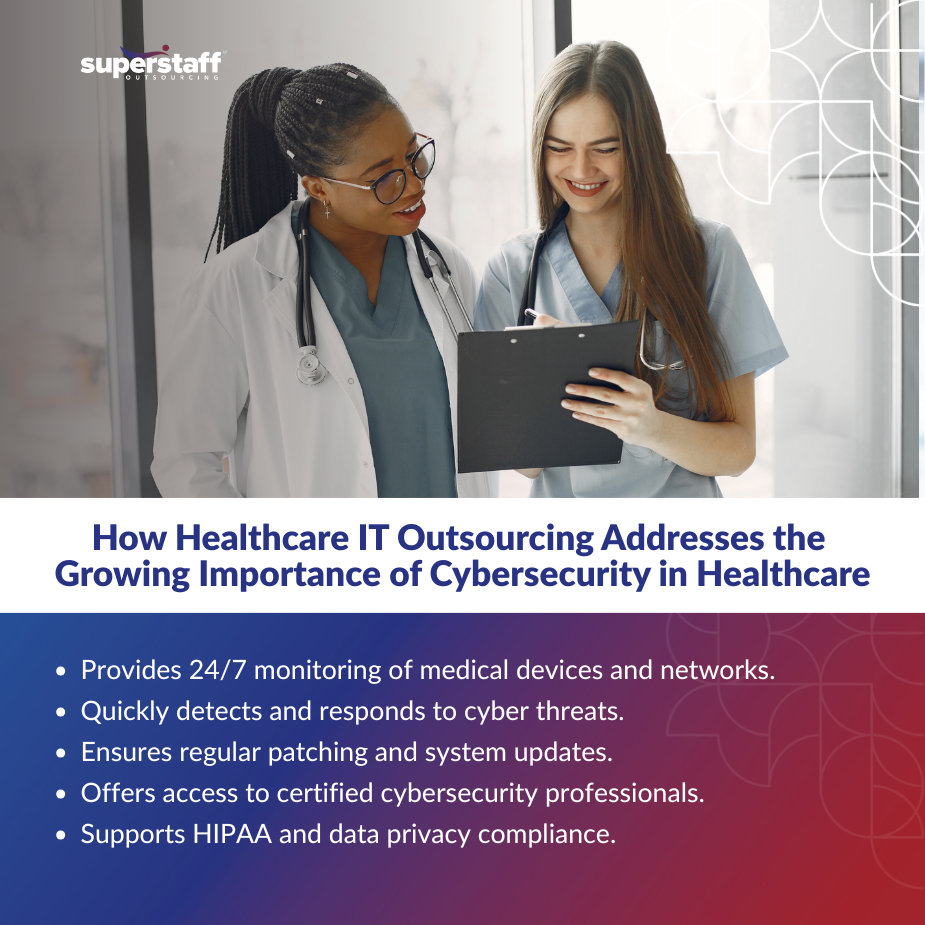
As federal and institutional budgets tighten, cybersecurity is one of the first areas to feel the pressure, especially for medical devices. These devices, now commonly connected through the Internet of Medical Things (IoMT), are essential to patient care. But without proper protection, they become easy targets for cyberattacks.
The importance of cybersecurity in healthcare goes far beyond protecting data—it’s about safeguarding lives. Yet the high cost of keeping systems secure, combined with shrinking funds, leaves many healthcare providers vulnerable. This growing risk calls for a new approach.
Healthcare IT outsourcing has emerged as a practical solution. By leveraging outside expertise, providers can maintain strong cybersecurity defenses, even when internal budgets can’t keep up. This blog explores how outsourcing IT services to protect medical devices can help healthcare organizations navigate a changing cybersecurity landscape.
Medical Device Cybersecurity Is Under Threat from Budget Cuts
Budget cuts are placing critical cybersecurity programs at risk, especially those focused on connected medical devices. As healthcare systems invest in modern technologies, security funding hasn’t kept pace.
- Increased adoption of IoMT devices means more endpoints to protect, each vulnerable to exploitation if not regularly monitored and patched.
- Reduced endpoint protection and device monitoring investment leads to outdated systems with known vulnerabilities.
- The FDA and other agencies have issued multiple alerts about cyber risks affecting common devices like insulin pumps, pacemakers, and imaging systems.
As the costs of compliance and continuous updates mount, many institutions are forced to make hard choices. Unfortunately, security often ends up on the chopping block.
With vulnerabilities rising, healthcare providers must find alternative ways to protect patients and systems.
The High Stakes of Weak Cybersecurity in Healthcare
Cybersecurity is not just a compliance checkbox—it’s a core pillar of patient safety and operational integrity. Yet, many healthcare organizations face mounting healthcare data security challenges that put both patients and providers at risk.
- Patient safety risks arise when connected medical devices are compromised, leading to incorrect readings, treatment delays, or device malfunctions.
- HIPAA violations and data breaches can result from unpatched vulnerabilities, exposing sensitive patient information and creating legal liabilities.
- Reputational and financial damage is inevitable after a high-profile breach, shaking public trust and triggering fines, lawsuits, and operational setbacks.
These outcomes reinforce the importance of cybersecurity in healthcare, especially as the threat landscape evolves. Unfortunately, under-resourced IT teams often lack the tools, talent, and time to manage these growing risks.
Outsourcing healthcare IT offers a practical way to overcome healthcare data security challenges, ensuring critical protections remain in place even when internal budgets fall short.

Healthcare IT Outsourcing Fills the Gaps Without Ballooning Costs
In an environment where medical budgets are shrinking and cybersecurity threats are multiplying, healthcare outsourcing has become a practical and cost-effective strategy. By tapping into external expertise, healthcare providers can maintain high protection without the overhead of building and sustaining sizable in-house IT security teams.
24/7 Remote Monitoring
24/7 remote monitoring is one of the most critical benefits of outsourcing. Cyber threats don’t stick to business hours, and medical devices are vulnerable around the clock. Outsourced partners provide constant surveillance, using advanced tools and threat intelligence to detect anomalies in real time. When a breach attempt or system irregularity is detected, response protocols are triggered immediately, reducing dwell time and limiting damage before it escalates.
Proactive Patch Management
Proactive patch management and vulnerability scanning are essential components of any strong IT security framework, especially given the importance of cybersecurity in healthcare. Many cyberattacks target known vulnerabilities in medical devices and healthcare systems—gaps that could easily be closed with timely software updates.
Outsourced IT teams bring the expertise and resources to continuously monitor for these flaws, prioritize risks, and deploy patches efficiently across networks and connected devices. This minimizes disruption to clinical operations while ensuring critical systems remain protected. In an industry where even a brief lapse in security can put patient lives at risk, staying ahead of threats through consistent patch management is not optional—it’s a necessity.
Incident Response and Disaster Recovery
Incident response and disaster recovery planning form the backbone of any strong cybersecurity posture. When healthcare organizations face a ransomware attack, system failure, or data breach, every second counts. Outsourcing partners often bring pre-built, tested frameworks for rapid response and recovery. These frameworks help organizations restore operations quickly, reduce patient care disruption, and protect sensitive health data during crises.
Compliance Documentation Support
Support for compliance documentation is another key advantage. Regulations like HIPAA require meticulous documentation of security protocols, access logs, and breach response efforts. Outsourced providers maintain detailed records, provide audit support, and ensure systems align with the latest legal and regulatory requirements, freeing internal staff to focus on core clinical and operational tasks.
Improving Cost-Effectiveness and Productivity
Beyond affordability, outsourcing delivers consistency, speed, and scalability, often lacking in overburdened internal teams. IT outsourcing addresses immediate security concerns and positions healthcare providers for long-term growth and modernization. As technology evolves and security threats grow more complex, having a reliable, expert-driven IT framework becomes essential for staying ahead.
But beyond bridging gaps, outsourcing enables healthcare providers to modernize and scale their IT infrastructure, transforming cybersecurity from a liability into a strategic advantage.
Access to Advanced Cybersecurity Talent and Technology
Smaller healthcare organizations often lack the budget or access to in-demand cybersecurity professionals.
- Outsourced providers offer dedicated cybersecurity teams trained specifically in healthcare technologies and regulatory compliance.
- Access to global threat intelligence and advanced tools ensures that emerging threats are identified early.
- Third-party infrastructure benefits from economies of scale, reducing costs while boosting security capabilities.
In contrast, many hospitals still operate on legacy systems that are difficult to secure and expensive to update. This partnership not only sustains IT security but enhances long-term resilience.
Building Resilience Through a Scalable, Hybrid Model
Outsourcing doesn’t mean replacing your entire internal IT team—it’s about strategic collaboration.
- Scalable services adjust to meet evolving threat levels and organizational needs.
- Non-core cybersecurity tasks like patch management or system monitoring can be offloaded, allowing internal teams to focus on higher-priority work.
- Co-managed models provide visibility and shared control, blending internal knowledge with external expertise.
This hybrid model strengthens cybersecurity without compromising internal governance or culture. Let’s look at how this works in real-world healthcare systems.
Real-World Wins: How Healthcare Systems Benefit from IT Outsourcing
Organizations that have embraced healthcare IT outsourcing are already seeing measurable improvements.
- Reduced incidents of breaches or extended system downtime after implementing outsourced cybersecurity monitoring.
- Improved audit scores due to consistent patching, documentation, and compliance support.
- Faster rollout of security protocols following emerging threats or regulatory updates.
While much attention is given to IT solutions for hospitality industry settings or financial services, these success stories show that healthcare can benefit just as much, if not more. As medical device cybersecurity faces uncertain funding, proactive outsourcing strategies become a critical safeguard.
From Risk to Resilience: Embracing the Importance of Cybersecurity in Healthcare With SuperStaff
As budget constraints loom over medical device cybersecurity, outsourcing healthcare IT functions offers a sustainable, effective solution. SuperStaff’s healthcare IT outsourcing services are designed to help providers bridge internal gaps, access world-class cybersecurity expertise, and maintain regulatory compliance, without inflating overhead costs.
Our scalable support empowers healthcare organizations to stay protected in an increasingly complex digital environment. From proactive threat monitoring to compliance documentation and disaster recovery, SuperStaff delivers the tools and talent needed to meet today’s security demands.
Healthcare leaders don’t need to wait for the next crisis. Now is the time to partner with a trusted provider like SuperStaff and take proactive steps to defend medical device infrastructure and protect patient lives.






